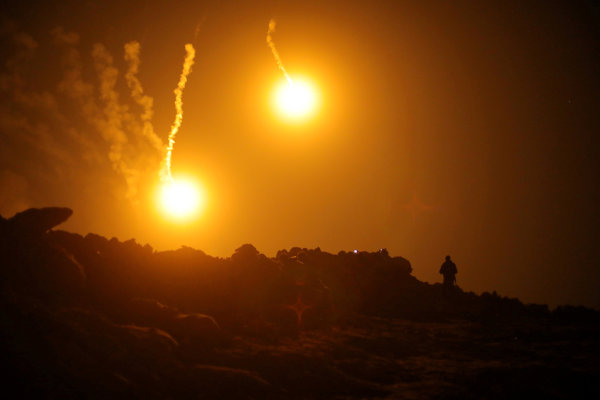

BEIRUT (Reuters) – Iran and Syria on Monday demanded the United States withdraw its troops from Syria, and the Damascus government threatened to defeat Washington’s Kurdish allies by force if they did not submit to the return of state authority.
The Iranian and Syrian military chiefs were speaking after a meeting in Damascus that also included their Iraqi counterpart, who gave a political boost to President Bashar al-Assad and Tehran by announcing the Syrian border would soon be reopened.
Their remarks point to the risks of a new escalation in Syria after the defeat of Islamic State, with Assad seeking to retake the two major territories outside his control, and the United States working to curb Iranian influence.
Washington has vowed to contain what it calls Tehran’s “destabilizing” role in the region, but the entrenched nature of Iran’s ties with both Damascus and Baghdad were on vivid display on Monday.
Standing alongside his Iraqi and Syrian counterparts on live television, Iran’s armed forces chief of staff Major General Mohammad Baqeri said the three countries were “united against terrorism” and coordinating at a high level.
The United States said last month it would keep some forces in Syria, reversing course from an earlier decision to pull them all out once Islamic State is militarily defeated.
It has deployed air power and some ground troops in support of the Kurdish-led Syrian Democratic Forces (SDF) militia that is close to seizing the jihadists’ last enclave in eastern Syria. It also has a military base at Tanf, near the Damascus-Baghdad highway and the Iraq and Syrian frontier.
After Washington in December announced its intention to pull out troops, the Kurdish-led authorities controlling northeast Syria unsuccessfully sought a deal with Damascus to protect their area from a potential Turkish assault.
“The only card remaining in the hands of the Americans and their allies is the SDF, and it will be dealt with through the two methods used by the Syrian state: national reconciliation or the liberation of the areas that they control through force,” Syrian Defence Minister General Ali Abdullah Ayoub said.
Large areas of Syria have been brought back under government control through “reconciliation agreements” that have typically been concluded after the military defeat of rebel forces.
‘Readiness for sacrifice’
Ayoub noted there was no doubt that U.S. military capabilities were “big and advanced” but said that the Syrian army’s sources of strength included a “readiness for sacrifices” and it was “capable of taking action and having an effect”.
Baqeri said the Damascus meeting had “studied the means that should be taken to recover” territories still outside government hands, including the areas of U.S. deployment, adding the decision in this regard was up to the Syrian state.
Syria’s border crossing with Iraq has been closed for years. The area was overrun by Islamic State in 2014, which swore to eradicate modern nation states and meld them into its self-declared caliphate.
“God willing the coming days will witness the opening of the border crossing and the continuation of visits and trade between the two countries,” Iraqi Lieutenant General Othman al-Ghanimi said at a news conference broadcast by Syrian state television.
Baqeri said opening the border was important to Iran because of trade and for Iranian tourists traveling to Iraq and then Syria. Critics of Iran have voiced concerns over a “land bridge” for Iranian influence to the Mediterranean and the Israeli border.
For Assad, reopening the Iraqi border will accelerate Syria’s physical reintegration with neighboring economies after the opening of the frontier crossing with Jordan last year.
SEE ALSO: Mission Creep, Thy Name Is Syria: Up To 1,000 US Troops May Remain After ISIS Is Defeated
WATCH NEXT: President Trump Discusses Syria